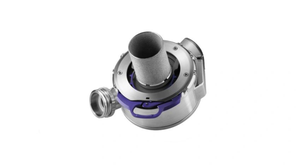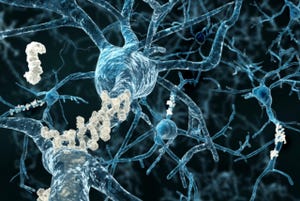May 6, 2020
SARS-CoV-2, the coronavirus that causes COVID-19, has a nasty habit of lingering on surfaces for extended periods of time. For example, active virus particles were found on the Diamond Princess cruise ship 17 days after it had been evacuated. Disinfectants in current use temporarily remove the virus from surfaces such as doorknobs and handrails but don’t protect them from being contaminated anew. Scientists in Israel are engineering novel surface coatings that will have a long-term effect neutralizing the virus, according to a news report. The coatings contain nanoparticles of safe metal ions and polymers with anti-viral and anti-microbial activity that can be sprayed or painted on surfaces.
|
PhD student Esti Toledo (seated) and post-doc Guillaume Le Saux, shown here in Dr. Mark Schvartzman's laboratory, participated in the research. Image courtesy Dani Machlis. |
Researchers at Ben-Gurion University (BGU) and the National Institute of Biotechnology in the Negev (NIBN), a research institute within BGU, have assessed the effect of surfaces coated with nanoparticles of various metals on the infectivity of lentiviruses, which belong to the HIV family, in human cells. Findings show that surfaces coated with copper nanoparticles strongly block infection of the cells by the virus. These ongoing experiments show a huge potential for copper ions in preventing surface-mediated infection with SARS-CoV-2, said the release.
Based on these findings, Prof. Angel Porgador from BGU’s Department of Microbiology, Immunology and Genetics and the NIBN, and Dr. Mark Schvartzman at the BGU Department of Materials Engineering are developing anti-viral coatings that can be painted or sprayed on surfaces. The coatings are based on polymers that contain nanoparticles of copper and other metals. The nanoparticles embedded in the polymer will enable controlled release of metal ions onto the coated surface. Studies show that these ions have a strong anti-viral effect, which can eradicate virus particles that adhere to the surface. Because the release of ions is extremely slow, the coating can be effective for weeks and even months, and it will reduce more than tenfold the infectivity of the virus particles, said the news release.
PhD students Yariv Greenshpan and Esti Toledo, and postdoc Guillaume Le Saux also participated in the research.
"The need to develop anti-viral coatings has greatly increased recently, with the SARS-CoV-2 outbreak, and this need will likely remain high even after the pandemic ends, due to increased awareness,” commented Josh Peleg, CEO of the university’s technology transfer department, BGN Technologies. “In addition, the product will be efficient as a general anti-viral and anti-bacterial coating. It can be applicable for medical settings, as an anti-pathogenic substance in places with increased risk of contamination, such as hospitals, but also for home use, and in public spaces such as schools, airports, public transportation and cinemas,” said Peleg.
"While current surface disinfection methods rely mostly on substances that are poisonous for people, such as bleach, or on substances that evaporate readily being based on alcohol, the coating that we are developing is based on metals that are toxic for viruses or bacteria, but completely human friendly,” said Schvartzman. “It should be noted that until now using such metals for anti-viral applications has encountered significant challenges due to the nature of the metals, such as the tendency to oxidize and corrode. Nanoparticles provide a solution to these obstacles.” Schvartzman also noted that nanoparticles benefit from a large surface area to volume ratio, thereby providing an efficient anti-viral surface area using a relatively small amount of metal. “Additionally, nanoparticles of anti-viral metal can be easily embedded in a polymer that can coat the relevant surfaces for extended periods of time,” he added.
Porgador stressed that the coatings they are developing are not limited to combatting transmission of the coronavirus. The coatings will be effective against other viruses, as well, “as indicated in our proof of concept experiments, and also against bacteria, so they will be relevant for a wide range of applications,” said Porgador.
About the Author(s)
You May Also Like

.png?width=300&auto=webp&quality=80&disable=upscale)

